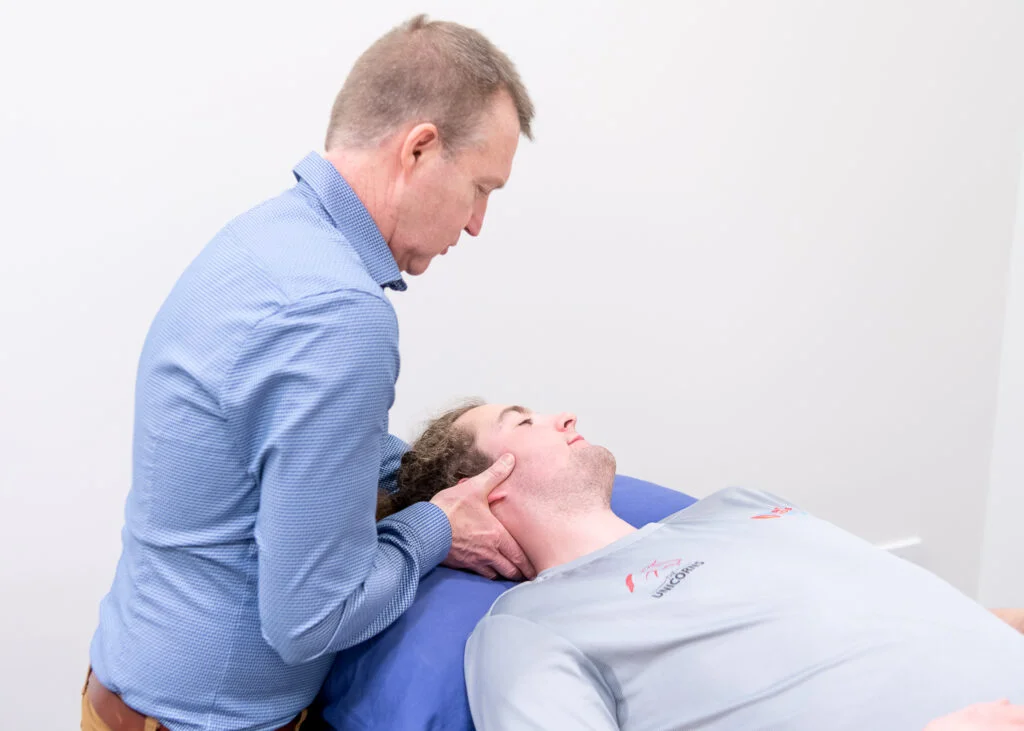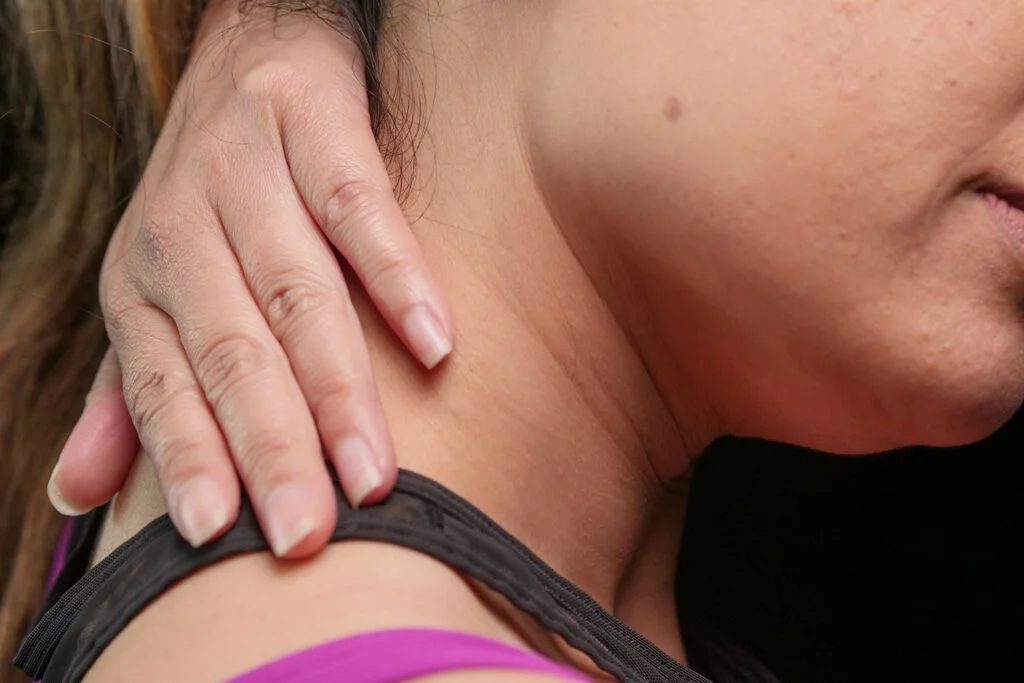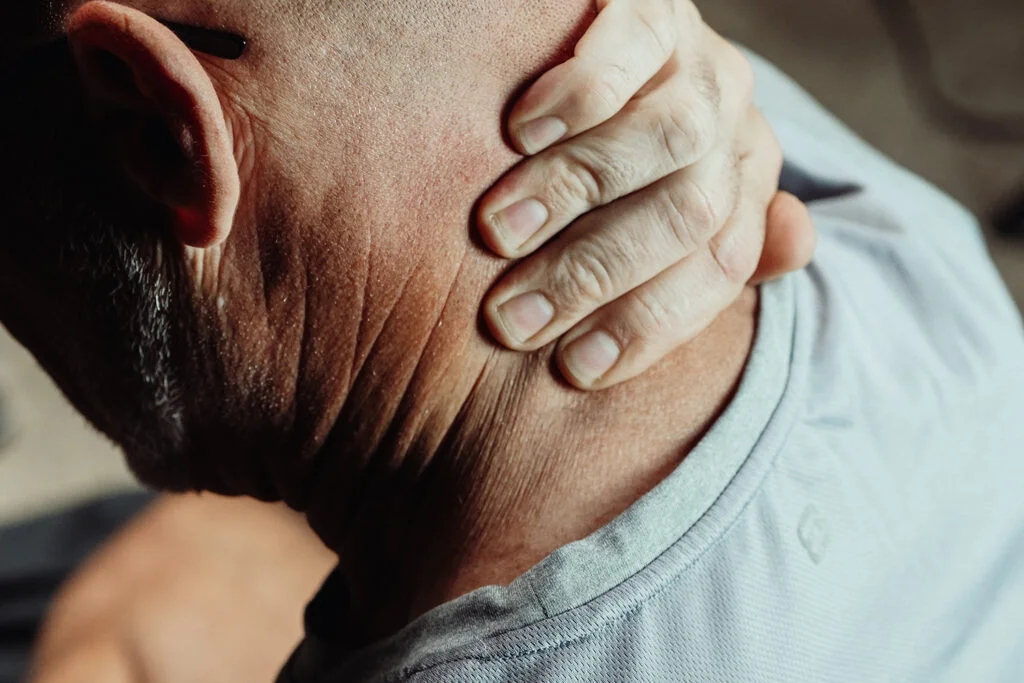
Neck pain is an extremely common symptom presentation that physiotherapists and general practitioners see in adults. It’s likely we have or will experience some form of neck pain or discomfort in our lifetime, this making high-quality management all the more important.

Well, it is not a diagnosis, it just says where the pain is. So let’s start with understanding the neck itself. The neck can be viewed as a collection of joints and muscles that support and move the head. Of course, they also provide vital pathways of food, breath and nerve system function for our vital organs and extremities.
We provide care and treatment for the neck with respect to the musculoskeletal system. In the neck, we have seven vertebrae which are the bones of our cervical spine. These vertebrae form joints in our neck, with hydraulic load-absorbing discs that separate the bones and with the muscles and ligaments that hold the cervical spine together. These structures allow our necks to be mobile in order for us to do simple daily activities. The neck also contains nerves, vascular and muscular structures that are all susceptible to injury and can cause pain.
Neck pain may be felt at the base of the skull and spread across the shoulder on one side and even down the arm. It may also lead to headaches or be part of migraine symptoms. The pain may feel like a kink or stiffness in the neck or severe pain. Range of motion may be limited, usually more to one side than the other, making it difficult to drive or look over the shoulder. Neck pain may be caused by bad posture, normal wear and tear, overuse or injury.
Activities like head checking, looking at our phones, looking at our computers, or turning to hear someone calling our name are all activities in which we move our neck without even thinking most of the time. However, because of how much we use our neck in our daily lives, it can be susceptible to pain and or injury. Our neck is an essential aspect of movement throughout our every day, and if impaired, can be debilitating.
Although we have a vast amount of complex and sensitive structures in the neck, the most common causes of neck pain are due to one of the following:
Our neck has many muscles built to guide and support the head to track your surroundings which can become tight or weak, causing your neck to be in pain.
Our neck gives rise to a bundle of nerves called the brachial plexus which can present as stiffness in our neck and pain going down the arm and into the hand.
Those who are in sustained postures or playing sport can sprain the joints in their neck, leading to neck pain. Arthritis in the joints is another factor that can cause pain in some, but not always. Repeated studies clearly show have shown Xray or Scanned changes in the neck is not always associated with higher levels of pain, so it might not cause pain in everyone.
Don’t slip, period. While a disc can protrude this may be part of life’s natural journey for a disc. It may or may not be a factor. If a disc is injured, it can present as pain in the neck and can cause other symptoms such as impaired reflexes, muscular weakness, and pain down into the arm.
There are other, sometimes more serious health conditions that cause neck pain other than what has been discussed above. Some of these conditions are more common than others, but some you might not always think of. Other diagnoses that can cause of neck pain include: There are other, sometimes more serious health conditions that cause neck pain other than what has been discussed above. Some of these conditions are more common than others, but some you might not always think of. Other diagnoses that can cause of neck pain include:
Trauma to the neck can occur with whiplash and is a very common cause of traumatic neck pain. Trauma in severe cases can cause fracture and severe ligaments damage that may require immediate medical attention.
Meningitis is a serious viral or bacterial illness that causes headaches, fever, stiff neck (serious enough to make it difficult to touch the chin to the chest) and sometimes vomiting. This is a serious condition that will require immediate medical attention.
The flu is another condition that can cause headaches and neck pain but it usually without the stiffness. It will be best you see a clinician once your symptoms have subsided.
Stress and tension in our lives can also give rise to what is sometimes called ‘tension’ headaches and neck pain.
This is a contraction of the neck muscles causing the head to be tilted to one side of the body and the chin to be turned toward the opposite side of the neck.

This will come down to a diagnosis of each person’s type of neck pain. The reason for our neck being sore can be put into two broad categories. One category consists of things that can be changed, such as strength, posture, habitual movements and movement sense. The other category are those things that are fixed and cannot be changed, like genetics, and to a good extent, your structure. What is most important are those factors that can be changed.
Let’s talk about those.
Posture is one of the main contributors of neck pain and sometimes headaches. The rule is to keep the head in a neutral position. Many of us tend to hunch or bend the neck forward while reading or working at the computer. In some offices the computer may be at a much higher level than the head, causing the individual to look up for extended periods. Sleeping with your neck too high or too low can cause neck pain and headaches, as well as a mattress that does not support the natural curve of the back. Contrary to popular belief, there is no clear “perfect” posture. The best way to maintain a good posture, is to mix up your positions throughout the day. Too much of any one position can lead to pain.
Science has shown a link between high-stress levels and poor sleep can affect our body's ability to recover from our neck injury.
Our neck needs to be mobile and strong. It needs to control head movement so we can follow our world with our eyes and ears. It is required to support a heavy 5kg structure called our head throughout the whole day. If our neck isn’t strong, mobile or able to have a good position sense, then this can be a major risk factor for pain in the neck.
This is more about overall activity levels and things we choose to do like smoking and lack of exercise. Having a high sedentary lifestyle and being a heavy smoker has shown to impact recovery and healing times for our injuries.
There are many beliefs and misconceptions surrounding the spine, especially in our neck. People get told they have a “slipped disc” or that their spine is “out of place.” People that get told these things don’t get a totally clear explanation as to why, and it can create a picture in their head that they have something seriously wrong with their neck. This can be a major barrier to recovery if you the patient, don’t understand what is wrong.
It’s likely at some point we have or will experience some neck pain. For the majority, it can be managed by a health professional such as a physiotherapist. Surgery is not going to be needed in most cases. Neck pain, much like low back pain, can be linked to what we inherited from our parents, past or recent injuries, changes with age, and the kind of work and sports we do. The focus should be around what you can do to reduce the risk of neck pain and how to best manage this condition with a reduced risk of re-injury.
Being active is a great way to keep your musculoskeletal (MSK) system nourished as movement can help our body recover. We can guide you how.
Get informed with the right information by a health professional. Heavily researched studies have shown people who suffer from neck pain can recover quicker when they have the right information about the condition. However, having the wrong information has shown to poorer and longer recovery times.
Sleep is where our body does the majority of its recovery. Good sleep enables our body to heal more effectively.

Best practice involves US asking YOU questions about YOUR neck pain to start. We want to get clear on how we can help you and it starts by us hearing your story.
A physical assessment is what comes next. This includes an examination of your neck, your history and specific joint, muscle and nerve testing. In the beginning, radiology, such as x-rays and scans are not needed once we are satisfied we are dealing with a musculoskeletal problem.
The mechanism of your neck pain is unique to you. From the informed clinical opinion from one of our clinicians, the cause of your neck pain is determined. This could be due to a number of mechanisms and this will be explained to you.
From our assessment, you will have an informed clinical opinion and a way forward to recovery
Treatment for neck pain requires careful diagnosis and treatment from a professional depending on the condition. The goal of physiotherapy is to help you return to your prior level of functioning and assist you in living a pain-free life.
There are a variety of ways to treat the neck. Options for manual therapy include:
An exercise program will be created specific to you and your condition. It will likely be based around improving a combination of the following.
Proprioception is our ability to tell where our body is in time and space. Sometimes our neck can impact our proprioception, and can be something to target in rehabilitation.
Stretching and exercises based around improving a restricted neck will likely be given to you. It’s common for a neck in pain to be restricted.
We need our neck to be strong through various positions and actions throughout the day. Making sure it is strong can help with it being compromised in the first place.
Our neck needs to hold a majority of sustained postures throughout the day. If we don’t have the endurance to cope, our neck can be susceptible to pain. Hold exercises and high repetitions can help with this.
Agility might not be something we think about with our neck, but it is essential. We need to perform rapid movements throughout our day as if it's normal. Head checking when driving or crossing a busy road requires our neck to be agile. Exercises by a trained professional can target neck agility.
In cases where the neck injury is deemed to be more severe or isn’t improving, referral to your GP might be required. This could be for other forms of management like imaging or pain medication. We will let you know if this is the case.
It’s likely an X-Ray or any form of imaging will provide little benefit if your condition is musculoskeletal. Many radiology findings are just a result of life’s journey. Paying too much attention to these changes can be a waste of time and bad for your health. It’s possible the findings you see have been present for months, sometimes years and you haven’t even noticed. Those findings may not even be the root cause of why you are in pain. If you have already undertaken imaging prior to seeing us, you are welcome to bring them to your first appointment.
If we determine that you need a scan or x-ray, we can refer out specifically for the imaging that would assist us in your management.
We are a clinic of experienced practitioners working together for you. We use the best scientific research to inform the decisions we take for your care. We do this with honesty and empathy.